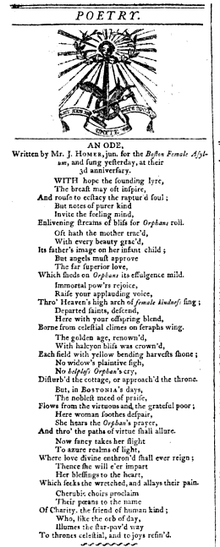Boston Female Asylum
The Boston Female Asylum (1800-1910) was an orphanage in Boston, Massachusetts, "for the care of indigent girls."[1] Its mission was to "receive ... protect ... and instruct ... female orphans until the age of 10 years, when they are placed in respectable families."[2]
History
The Asylum incorporated in 1803. Hannah Stillman served as its first director. Founding board members included Sarah Bowdoin, Elizabeth Perkins, Elizabth Thurston, Mary Hubbard, Sarah Parkman, Hannah Smith, Mary Gray, Abigail May, Margaret Whitwell, Elizabeth Dorr, Mary Grew, Ann Green, Margaret Cooper and Elizabeth Goodwin.[3] At the time, "the only public charities then existing in our good town of Boston, except the Almshouse, were the Boston Marine Society, ... the Boston Humane Society, ... and the Boston Dispensary.[4] As late as 1886, some found notable that "the asylum is under the direction of a board of lady managers."[5]

Early supporters included Robert Treat Paine, Jr. Annual fundraising events raised substantial sums. For instance, the 1803 fundraiser at Trinity Church included a sermon by Samuel Parker, "an ode written for the occasion, ... [and] the Franklin Musical Society [which] performed the musical part, to great satisfaction." After the event, local newspaper publishers Gilbert & Dean wrote: "we have not learnt what collections the society made, but it must have been above five hundred dollars."[6]
In 1807 the orphanage was located on South Street;[2] in 1823 on Essex Street;[7] and from the ca.1840s on Washington Street. By 1873, "between 70 and 80 children are provided for in the Asylum. ... Annual expenses, which are between $11,000 and $12,000, are defrayed mostly by income from permanent funds, and to small extent by annual subscriptions."[8]
"Beginning in 1902, the managers of the asylum came to feel strongly ... in favor of the use of the family home for the care of children, in preference to the institution. Gradually their work took on new form, until, in 1907, the asylum was finally closed, and family home care was entirely substituted."[9]
In 1910 the organization changed its name to the Boston Society for the Care of Girls.[10] Some years later, it "merged with the Boston Children's Aid Society in 1923 to form the Children's Aid Association."[11] Then in 1960, Boston Children's Services "was formed through the merger of the Children’s Aid Association and the Boston Children’s Friend Society, an adoption agency with a history dating from 1883."[12] In the 2000s Boston Children’s Services, New England Home for Little Wanderers, Parents’ and Children’s Services, and Charles River Health Management merged into The Home for Little Wanderers, which provides a variety of services in Massachusetts.[13]
Locations in Boston
- South Street (ca.1807)[2]
- 62 Essex St. (ca.1823)[7]
- Washington St., corner Asylum St. (ca.1844-1857);[14] 750 Washington St. (ca.1873);[15] 1008 Washington St. (ca.1904)[1]
Variant names
- Asylum for Female Orphans[7]
- Boston Female Asylum for Orphans[16]
- Boston Female Society for Destitute Orphans[17]
- Female Orphan Asylum[14]

See also
References
- ↑ 1.0 1.1 U.S. Bureau of the Census. Benevolent institutions, 1904; p.78
- ↑ 2.0 2.1 2.2 Boston Directory. 1807
- ↑ Boston Female Asylum. Act of incorporation. 1803
- ↑ Reminiscences of the Boston Female Asylum. 1844; p.8
- ↑ Bacon's dictionary of Boston. 1886
- ↑ Boston Weekly Magazine, Sept. 24, 1803.
- ↑ 7.0 7.1 7.2 Boston Directory. 1823
- ↑ Annual report of the Board of State Charities of Massachusetts. 1874
- ↑ Hastings Hart. Preventive treatment of neglected children. NY: Russell Sage Foundation, 1910; p.163.
- ↑ Hart. 1910
- ↑ University of Massachusetts Boston. Boston Female Asylum: Records, 1800-1946. http://www.lib.umb.edu/node/1548 Retrieved 2010-06-03
- ↑ "Boston Children's Services ... is also descended from the Massachusetts Infant Asylum, the first foundling hospital in the U.S., and the North End Mission, a child-care agency and Sunday school founded in 1867. These two organizations merged with the Children’s Aid Association, a diverse child welfare agency whose original mission was to serve as a home for boys who had been released from jail." http://www.thehome.org/site/PageServer?pagename=about_history Retrieved 2010-06-03
- ↑ http://www.thehome.org/site/PageServer?pagename=about_locations Retrieved 2010-06-03
- ↑ 14.0 14.1 Boston Directory. 1848, 1856
- ↑ Annual report of the Board of State Charities of Massachusetts. 1874
- ↑ American Broadsides and Ephemera, Series 1, no. 6376
- ↑ Wainwright. A sermon preached on the anniversary of the Boston Female Society for Destitute Orphans: September 25, 1835.
Further reading
| Wikimedia Commons has media related to Boston Female Asylum. |
- Robert Treat Paine, Jr. Communication on the Boston Female Asylum. Boston Gazette, April 1, 1802. Reprinted in: The works in verse and prose. 1812; p. 344+
- Samuel Parker. Sermon for the Benefit of the Boston Female Asylum. 1803.
- An account of the rise, progress, and present state of the Boston Female Asylum. Together with the act of incorporation. Also, the bye-laws, and rules and regulations, adopted by the Board of Managers. 1810.
- F.W.P. Greenwood. A Sermon delivered on the twenty-fifth anniversary of the Boston Female Asylum, Sept. 23, 1825. Boston: 1825
- An account of the Boston Female Asylum. 1833
- Jonathan Mayhew Wainwright. A sermon preached on the anniversary of the Boston Female Society for Destitute Orphans: September 25, 1835. Boston: Dutton and Wentworth, 1835
- Reminiscences of the Boston Female Asylum. 1844.
- Saved from the street. Our Boys and Girls, v.11, no.224, March 1872.
Coordinates: 42°20′45.15″N 71°3′53.23″W / 42.3458750°N 71.0647861°W